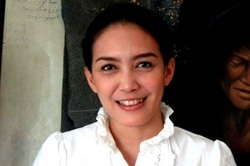
| Wed, 07/14/2010 9:04 AM | People
When a glitterati steps into the world of politics, the common reaction he or she might likely receive can be skeptical; “Yeah, right.”
Sometimes, it’s even worse.
If there’s any of them who has been in one of the worse situations, it’s actress-cum-lawmaker Rieke Diah Pitaloka, whose role as a rather dim housewife in a television sitcom has made her a subject of mockery at the House of Representatives.
“During hearings, they still call me ‘Oneng... Oneng’, which I think is not appropriate for formal forums,” says Rieke of the famous character she played in Bajaj Bajuri. “The way they call me, and even look at me is very downgrading – as if I’m o’on [dumb] just because I’m a celebrity.”
Rieke, who sits on the House’s commission IX overseeing welfare, admits she has no problem with people calling her “Oneng”, as the public still also often call her with that name. However, she says, it’s the different way the name is addressed that matters.
“Many people still call me ‘Oneng ‘too when they see me, but the way they do it is more like they love [the character],” says the 36-year-old politician of the Indonesian Democratic Party of Struggle (PDI-P). On the other hand, “the way those senior politicians from other parties call me is like they’re mocking me. But I told myself not to react; I told myself to prove them wrong —through my work”.
It’s indeed difficult to prove her efforts, especially when she’s part of the country’s “celeb-olitics” phenomena, whereby a number of celebrities have stepped out of their glamorous world and into the political arena. While they use their popularity to voice their political views, these glamorous faces are often presumed to be brainless and serve only as “vote magnets” for political parties during elections.
“I know people often think that we, celebrities, have joined the House with empty heads,” says the master graduate from University of Indonesia’s School of Philosophy. “I don’t want to comment on other celebrities, but in my case, I didn’t become a House member without a mission.
“I’m not the one who went: ‘OK, let’s see what will happen, I can learn first.’ For me, the time I decided to become a House member was the time when I had learned enough and was ready to fight,” she adds.
In her fight for laborers — to whom she has chosen to fight for in the House, Rieke, who’s also an activist, admits things have never been smooth. Labor issues, she says, is still far from her Commission’s attention. The deliberation of the domestic worker bill, for example, was again delayed despite the fact it was already listed as one of priorities in the House’s 2010-2015 national legislation programs.
“Just earlier this year, the House plenary session ruled out the bill as one of top priorities to be discussed, but just few weeks ago [that decision] was canceled,” reveals Rieke, who’s also the migrant workers ambassador for the International Labor Organization (ILO). “It truly disappoints me and my PDI-P colleagues, as [the party] has been fighting for this bill since 1999,” she adds.
Disappointment, indeed, has always been a large part of her struggle at the House, she said, admitting that the thought of quitting politics has crossed her mind.
“Being in politics is very hard. It’s very stressful to be involved in never-ending arguments during House sessions — especially when they don’t take a celebrity like me seriously,” says Rieke, who first joined the National Awakening Party (PKB) in 1999 but left in 2008 due to internal conflicts.
“During my first month [at the House], I couldn’t sleep at all because of the pressures. I told my husband and my family I wanted to quit,” adds the wife of young philosopher and UI lecturer Donny Gahral Adian.
Rieke puts her regained inspiration and courage to a group of abused migrant workers and their families she has met along hr journey in politics. She even keeps their photographs and documents as reminders.
“Whenever I feel weak, I look at their pictures for courage,” says Rieke. “Whenever I’m ‘attacked’ during the hearings, I imagine their faces to help speak my mind,” she adds.
Rieke’s deep interest in labor issues finds its roots in her father’s experience, who as a lawyer represented a maid who was raped by her employer but was jailed for aborting the child.
“When I was a kid, I often accompanied my father to the court, where I witnessed so many injustices,” Rieke says. “I grew up as someone who truly respects human rights and pluralism”.
Besides her childhood memories, Rieke also keeps her late mother’s advice as a reminder to keep her on the right track. The advice came years ago when she wanted to quit university because she thought her part-time job as an actress was good enough to support her.
“My mother then asked me: ‘What was your goal when you took those acting roles in the first place?
Didn’t you want to get money to finance your studies? So why would you want to quit now, when you have all the money you need?’,” recalls Rieke, who started her acting career in junior high school after being spotted by a talent scout in a teen tourism pageant in Garut, West Java. “So, I’ve learned that if you want to step back from what you’re doing, remember your intention; think about why you’re doing, what you’re doing”.
So, going back to her first destination in life — which is to contribute to the fight against injustice, Rieke has now committed her life to politics.
“I actually enjoy both worlds — entertainment and politics,” says the writer of Kekerasan Negara Menular ke Masyarakat (State Violence Spreads in Society).
“But, I have made my decision; I’m 35 — it’s time to realize my dream in politics and leave my entertainment world behind.”
http://www.thejakartapost.com/news/2010/07/14/rieke-diah-pitaloka-the-good-cause-%E2%80%98celebolitics%E2%80%99.html
